Jerusalem artichoke is a perennial plant that has adapted well to the harsh winters of a temperate climate. You can not dig it out every year, it winters well in the land, does not need watering and weeding, it always gives a good harvest. Jerusalem artichoke, the medicinal properties and contraindications of which are well studied, has no analogues, and deserves special attention.
Material Content:
Jerusalem artichoke: benefits for the body
The carbohydrate that makes up this root crop is called inulin. During storage, it turns into fructose, which gives Jerusalem artichoke a sweetish taste after cooking. Inulin is very useful for digestion, it supports the necessary microflora in the intestines.
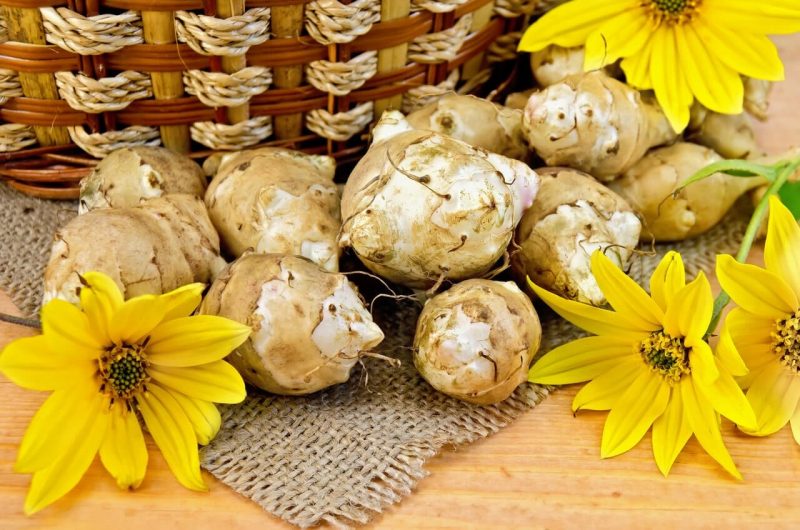
Jerusalem artichoke also has many microelements - magnesium, chromium, calcium, iron, various vitamins, especially group C. Jerusalem artichoke or ground pear is a unique vegetable that does not accumulate nitrates in itself. It does not form harmful substances during storage.
Jerusalem artichoke is used not only for food, but also for the preparation of nutritious masks. It helps maintain youth and beauty of the skin. To do this, the root vegetables are washed, peeled, rubbed on a fine grater and made from the resulting slurry face mask. In Jerusalem artichoke there are fruit acids that cleanse dead cells from the upper stratum corneum. This procedure helps to restore a healthy complexion. To improve the cleansing properties of the mask, you can add honey or lemon to it.
Jerusalem artichoke helps to heal many ailments, it is used in diet and preventive treatment.
Healing properties
The beneficial properties of Jerusalem artichoke are due to its chemical composition and high nutritional value.
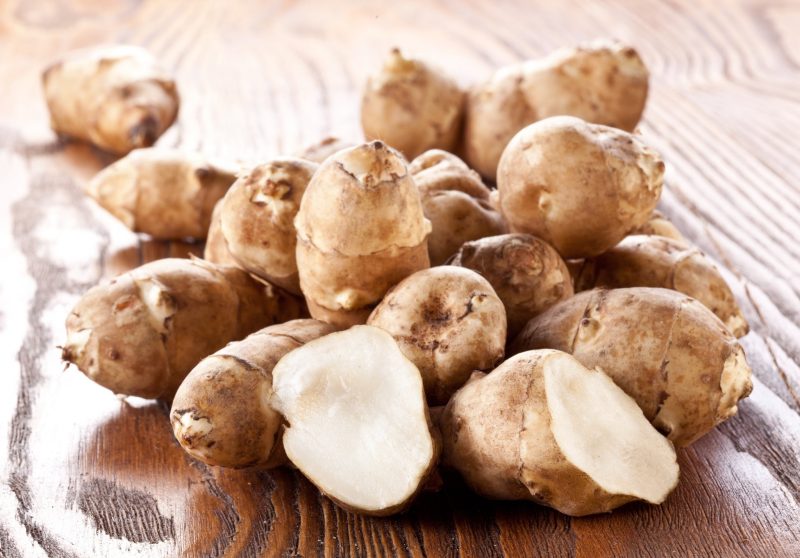
The consumption of this root crop helps:
- maintain youth;
- cleanse the body of toxins and heavy metals;
- increase immunity;
- reduce the incidence of acute respiratory infections in children and adults;
- prevent the development of oncology;
- treat the heart and blood vessels;
- improve eyesight;
- relieve joint pain, etc.
The leaves and stems of the plant are also healing, they make decoctions, teas, infusions for taking baths. Jerusalem artichoke helps in the treatment of anemia and hypertension, removes headaches, removes excess water from the body.
What diseases does it help?
Jerusalem artichoke is very useful for people with diabetes, it reduces blood sugar. When used significantly reduces the need for medication.

Jerusalem artichoke is also useful for healthy people to feel the result, you need to eat it regularly for 2-3 months. Eating root vegetables is a good prevention of not only diabetes mellitus, but also cardiovascular diseases.
With regular use of Jerusalem artichoke, vision improves, it relieves headaches associated with high blood pressure. To treat hypertension, tea is brewed from leaves, or a drink is made from dried root crops.
Baths from leaves and stems relieve joint pain. Jerusalem artichoke helps to preserve youth due to its unique ability to remove harmful substances from the large intestine.
It is interesting:Jerusalem artichoke
Earthen Pear Rules
When buying Jerusalem artichoke, you need to pay attention to the tubers being elastic, firm, not wrinkled. Store in a food paper bag in the refrigerator. If the root crop is cut, its shelf life should not exceed 2 days.
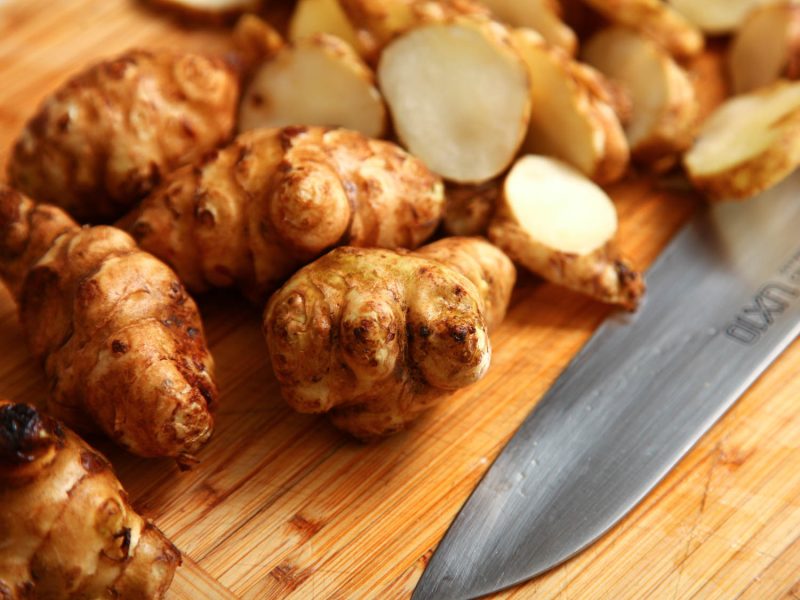
Raw vegetables have the most beneficial substances. It can be added to any vegetable salads. To taste, it resembles a juicy white cabbage stalk or radish, only a little sweeter and softer. There are varieties with large uniform nodules that are easy to clean.
To maintain health, you need to eat 100 g of Jerusalem artichoke per day.
First and second dishes are prepared from the root crop, pancakes are baked, kvass is made, jam is cooked. Dried tubers produce a wonderful drink that mimics coffee. You can make it at home. To do this, grated root crops are dried in a frying pan, and ground in a coffee grinder, like coffee beans, until finely ground. Then they brew in a coffee maker, getting a healing drink of brown color.
Useful properties for losing weight
The use of Jerusalem artichoke for food helps to normalize metabolic processes and cleanse the body of toxins. This helps in the fight against excess weight.
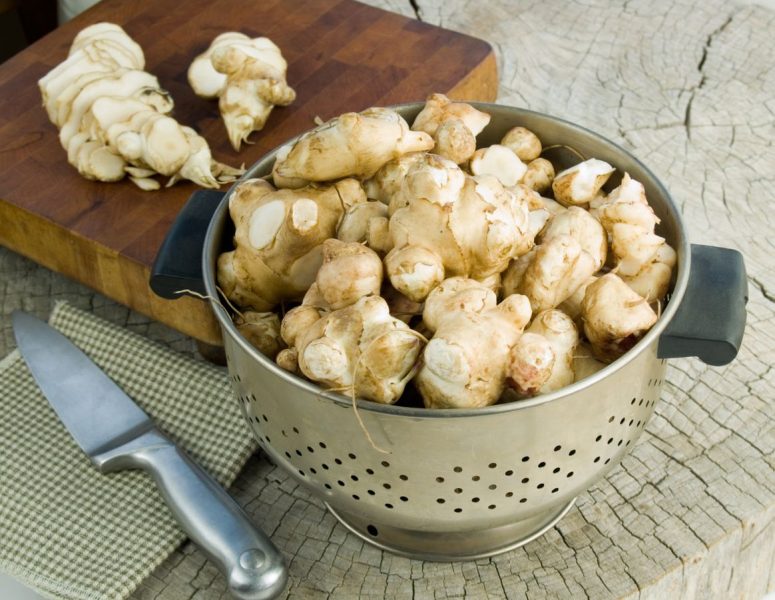
Thanks to inulin and dietary fiber contained in the root crop, digestion is normalized, and the work of the stomach improves. The problem of constipation and poisoning with toxins disappears, the appetite returns to normal.
With regular use of root vegetables, excess fluid leaves the body, as it has a diuretic effect. It also has a beneficial effect on health, and contributes to weight loss.
How to use for men's health?
The beneficial properties of Jerusalem artichoke help men of all ages to maintain the health of the genitourinary system. For the prevention of prostate adenoma, it is necessary to consume 100 g of tubers in raw or baked form daily.

You can prepare various salads from Jerusalem artichoke with the addition of vegetable oil and other healthy vegetables or bake in a pot with meat.
Jerusalem artichoke syrup: benefits and uses
Amber-yellow Jerusalem artichoke syrup is sweet in taste with a slight acidity. The sour taste is obtained by adding lemon juice to the recipe. The calorie content of the syrup is 267 kcal per 100 g. You can buy it in a pharmacy or cook it yourself at home, evaporating the juice squeezed from the tubers.
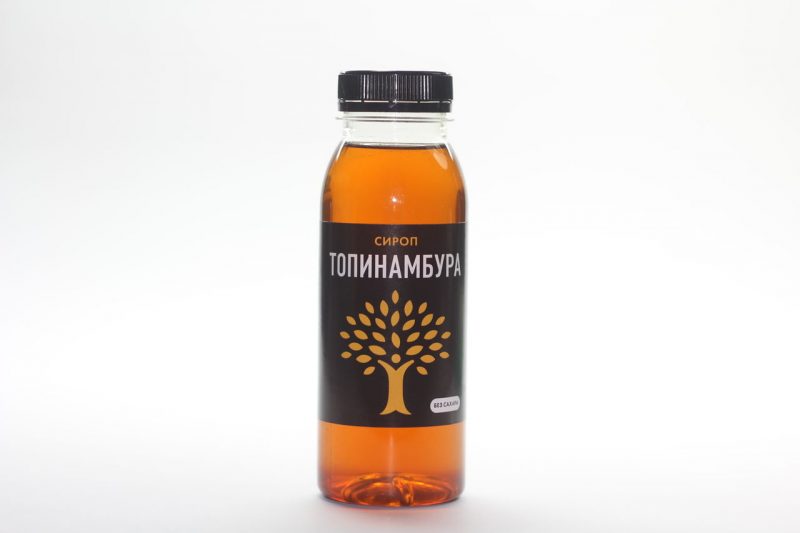
This syrup perfectly replaces granulated sugar during the diet. It is taken in the morning 1 hour before meals and in the evening before bedtime, 1 tbsp. l., for 14 days.
The health benefits of the syrup are manifested in improving overall well-being, strengthening immunity, normalizing metabolism, cleansing the body of toxins, and improving the digestive tract.
Green pear recipes
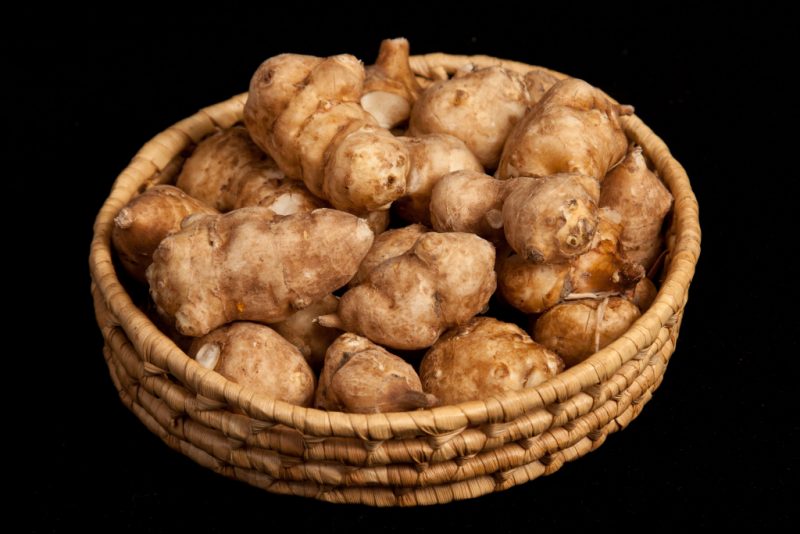
The recipes with Jerusalem artichoke are varied, they are fried, stewed, eaten raw, made from it salads, sweet pastries, drinks and preserves. After heat treatment, Jerusalem artichoke looks like sweet potato, but it is a completely different vegetable, and it is wrong to compare it with potatoes.
Jerusalem artichoke salad
The root crop in the salad does not have much taste, but is very useful. It quickly darkens, so after peeling it is advisable to sprinkle it with lemon juice.
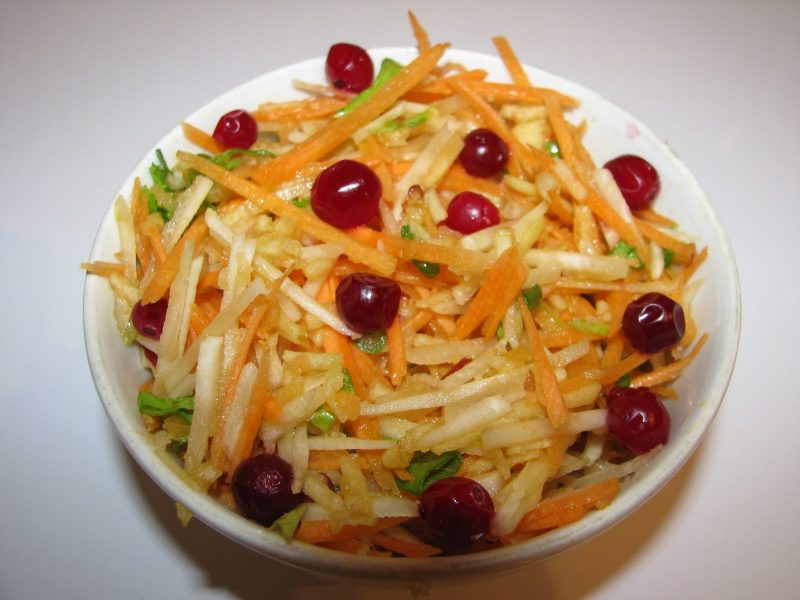
For salad, you can take:
- green apple;
- bell pepper;
- carrot;
- petiole celery;
- Peking or ordinary cabbage;
- fresh cucumber;
- Jerusalem artichoke.
Cooking:
- For a vegetable salad, Jerusalem artichoke tubers are rubbed with an apple and carrots.
- Bulgarian pepper is cut into thin strips, several branches of greens are crushed.
- Grated ingredients are watered with half lemon juice.
- Having mixed, the salad is seasoned with vegetable oil and soy sauce, decorated with a sprig of greens.
In a pot
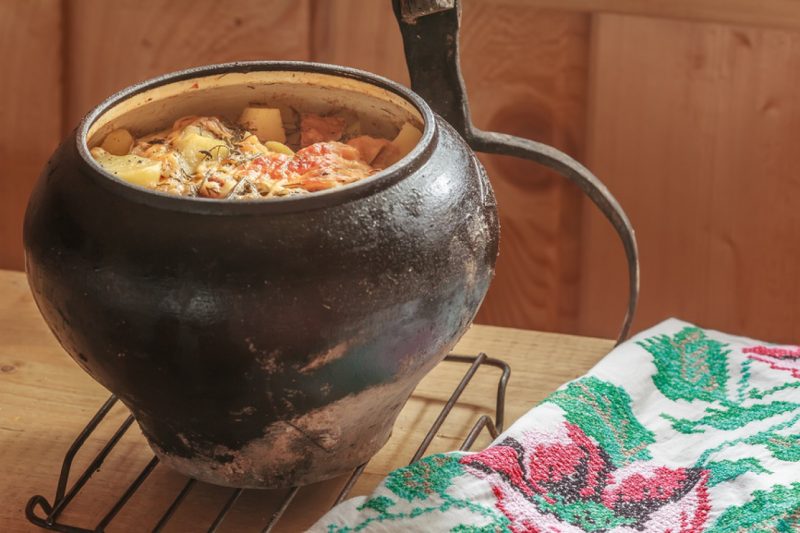
Tasty to cook a root crop in a pot. Layers are laid: a meat piece of pork or chicken, carrots, sweet peppers and peeled Jerusalem artichoke, sliced in slices. Top with grated hard cheese, or watered with mayonnaise. Vegetables and meat must be seasoned with spices. You can use Suneli hops, Provencal herbs, basil, paprika, black pepper, oregano, coriander. The pot is put in the oven, and stewed until cooked.
In the pan

Jerusalem artichoke can be fried in a pan. For this, tubers are sliced thinly, like chips. The skin can not be cleaned, just wash it well with a brush. Fried in vegetable oil, slightly sprinkled with salt.
Composition, calorie content
In terms of chemical composition, Jerusalem artichoke resembles potatoes, but it is much more nutritious.
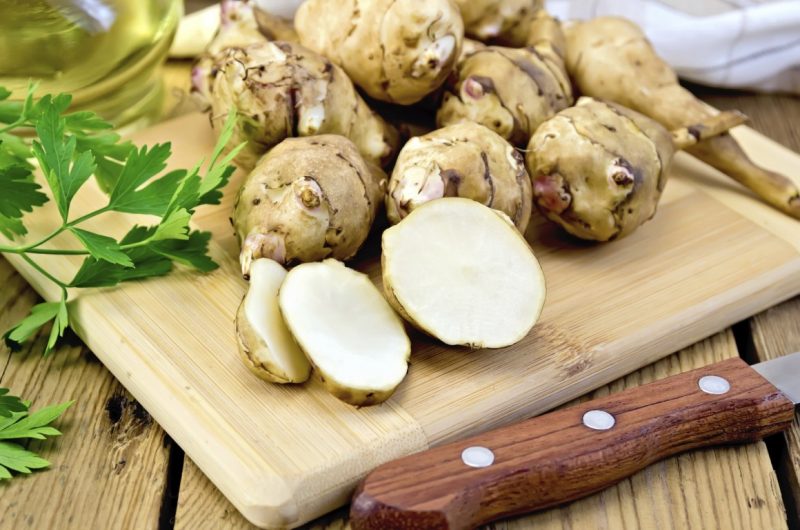
100 g of product contains:
- ash - 1.1 g;
- proteins - 3 g;
- water - 81 g;
- pectins - 0.1 g;
- fiber - 0.8 g;
- carbohydrates - 15 g.
Calorie content is 73 kcal.
In addition, the root crop is rich in minerals and vitamins:
- ascorbic acid - 20 g;
- thiamine - 0, 24 g;
- riboflavin - 0.5 g;
- folic acid - 1 mcg;
- niacin - 0.3 mcg;
- pyridoxine - 0.03 mcg;
- pantothenic acid - 0.1 g;
- potassium - 280 g;
- sodium - 3.4 mg;
- magnesium - 6 mg;
- iron - 180 mg;
- calcium - 16 mg.
The root crop also contains organic acids - malic, malonic, fumaric and succinic.
Contraindications and possible harm
The benefit of the root crop far exceeds the disadvantages. With caution, it should be used by those who are still unfamiliar with this vegetable in order to check the reaction of the body.
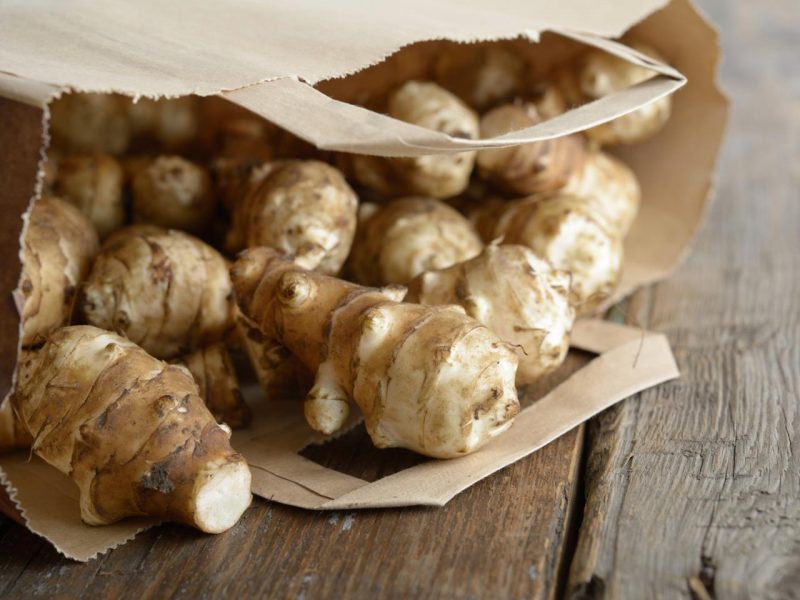
In people prone to flatulence, the consumption of root vegetables can cause a slight increased gas formation in the intestine. Caution should also be exercised for kidney stones or gall bladder.
It is very useful to take syrup or eat Jerusalem artichoke dishes, especially when there are still no obvious signs of a disease. Such a diet will be a good prevention of various ailments.












